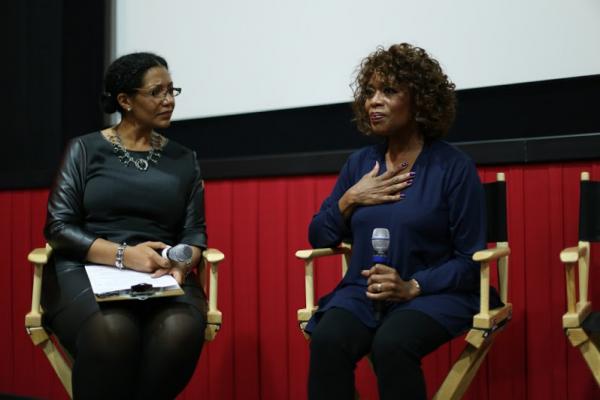The ethos of slavery still runs deep in our national consciousness. Alfre Woodard, a supporting actress in the upcoming movie 12 Years a Slave, hopes that point is taken by all who see it.
“Whenever there is repression, it takes toll on everyone; especially a physical and psychic, stunting pain on the abuser,” Woodard said at a panel following a pre-screening of the movie hosted by Sojourners last week. “My hope, expectation is that audiences will start to think about slavery in a new way. That they’ll come away with some small perspective to understand each other better.”
The panel gathered to begin the conversation about residual impacts of slavery on the United States. Woodard started the discussion with a description of what it was like to be set and involved with a film that revolves around such a difficult emotional topic.
Lisa Sharon Harper facilitated the discussion that followed between Woodard; Jim Wallis, president of Sojourners; Dr. Otis Moss III, pastor of Trinity United Church of Christ; Rev. Michael McBride, director of Urban Strategies of the PICO National Network; Dr. Barbara Williams-Skinner, co-chair of the National African American Clergy Network; and Galen Carey, vice president of government relations for the National Association of Evangelicals.
12 Years a Slave, directed by Steve McQueen, focuses on Solomon Northup (played by Chiwetel Ejiofor), a free black man from New York who is kidnapped and sold into slavery. His identity is stripped from him and he loses all connection to his wife and two children. Throughout the film Northup externally and emotionally fights against the unjust systems (and people supporting those systems) that stole his freedom and 12 years of his life from him.
After the film, the panel focused on how blacks are still affected by an ethos of inferiority in the U.S.
“The enduring theme is connected to black futility,” said McBride. “The bodies of black folks just don’t mean much. [The film] allows us to have a reference point so slavery is not just an historical event.”
As conversation turned towards action, there was a renewed call for civil conversation. Many of the panelists noted raw emotions and name calling that quickly crop up in public conversations.
“This is a very active, faithful company tonight,” said Woodard. “The very vast audience will not have these conversations. The vast, frankly, are clueless, and don’t know why they think what they think. Why they have the impulse to pull their purse away from someone that’s brown.”
Williams-Skinner hoped the film would offer blacks an opportunity to embrace and talk about their past in the United States. Comparing slavery to the Jewish Holocaust, she remarked that her “Jewish friends never had problems talking about the Holocaust as their ‘never again.’ If we can’t have discussion, how can repentance begin?”
Wallis added that white people also have a significant role to play in these discussions. “White people always leave it to people of color to talk about race,” he said. “The black man in the White House can almost never talk about race,” because the white reaction frequently tends towards claims of overreacting and “playing the race card.”
McBride also recognized the important role white people will continue to play, just as they did in Northup’s time. “The irony is that [Solomon] still needed white folk to let him free … and that is a daunting reality,” he said.
Echoing this concern, Williams-Skinner lamented the “inability of whites to talk about race today.” She paired that sentiment with the call for all in the U.S. to “realize we’re sick together and healed together.”
Also in attendance was Vera Williams, a great-great-great-granddaughter of Solomon Northup. Although Williams had seen the movie two previous times, she said the third time gave her a new perspective.
“I had the awareness that [Solomon] was looking right at the audience members this time,” she said. “He’s looking and speaking right at us. The thing about Solomon was that he was born a free man and was enslaved, but he decided to do something about it. He challenged the system. But ultimately, he paid with his life, because we don’t know what happened to him at the end of his life.”
“I felt like we’re all meant to be here at this time and this place,” Williams continued. “That all happened in 1853 and this is 2013; we are still talking about these issues. But God works it out.”
At the end of the event, participants were asked to text “RacismIsSin” to 877877, in order to join Sojourners in the movement against racism.
[view:Media=block_1]
Ben Sutter is online assistant for Sojourners. Rebecca Kraybill, editorial assistant for Sojourners magazine, contributed to the reporting of this story.
All photos by Brandon Hook / Sojourners
Got something to say about what you're reading? We value your feedback!
